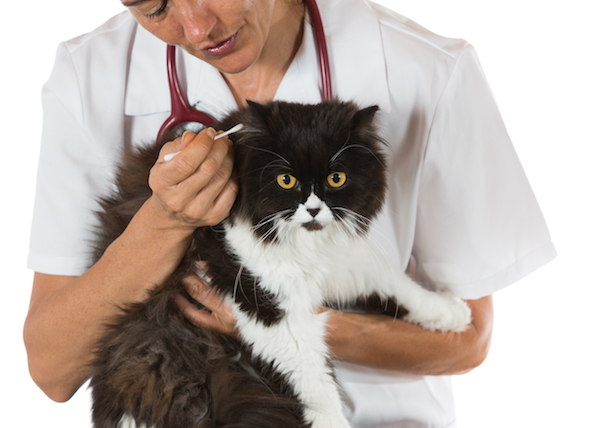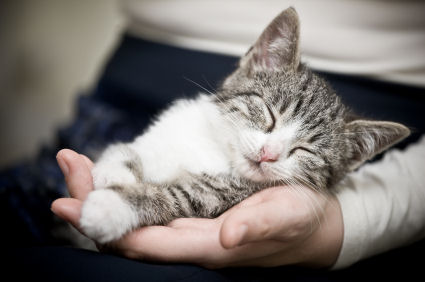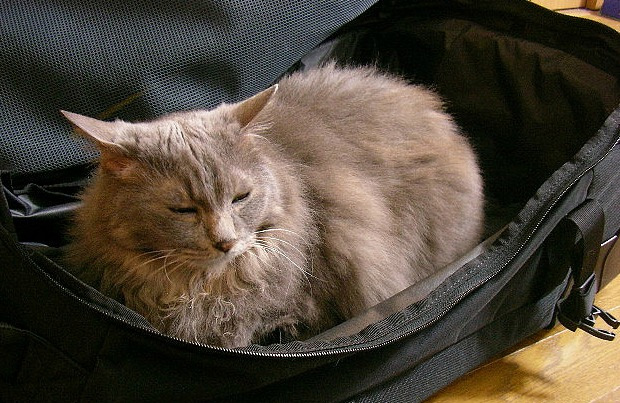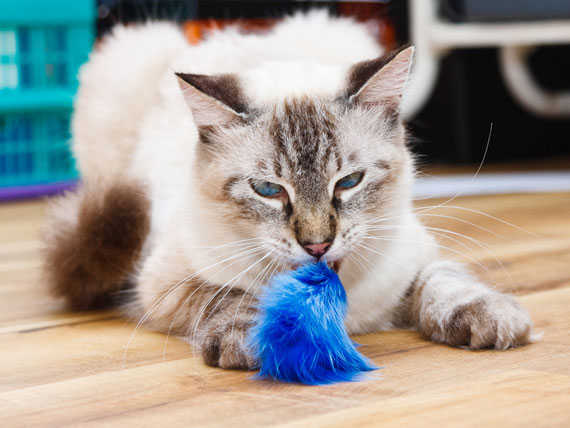A cat's main defense and protection comes from its claws. However, it is now becoming increasingly convenient and popular for cat owners to declaw their cats. This is usually done to prevent the cat from destroying furniture, curtains and scratching humans.
Are these reasons strong enough for you to decide to declaw your cat? It is indeed a convenience for the cat owner but many cats suffer after the surgery and many will end up with a biting habit as this has become the only defense it has. Even well meaning and reputed vets do not always do a good job of declawing.
Do you know that the declawing procedure is not merely a "nail removing" process? It is a surgical process which requires anesthesia. Your cat's first joint of every digit on your cat's forefeet is surgically amputated. It also involves the vet surgically separating entirely the distant finger bone (distal phalanx) from the middle finger bone.
Here are some possible situations you will see after your cat has been declawed:
Phantom Pain Throughout Its Life
Because a declawing surgery is basically a mutilation process which causes much post-operative pain to your cat, your cat may experience "phantom pain" during its life, even years after the surgery.
Biting To Defend Itself
As it has lost its only natural defense and protection, your cat may resort to biting you or your stuff to issue a warning or to show aggression. If you react to this by scolding him (which is a natural reaction), this will only aggravate the situation as your cat feels it needs to bite more to defend itself against your anger.
Unsafe To Go Outdoors
Your cat will no longer be able to defend itself if it should face any dangers outdoors. So it would mean you must take extra precautions to keep it indoors at all times.
Post-Operative Complications
Many vets are not trained to do the declawing surgery properly. Most of them use dog's nail trimmers, when they should really be using a scalpel blade. A dog's nail trimmer merely cuts the end and middle bone but does not separate them properly. It leaves germinal tissue which may eventually grow into an abnormal claw, causing a piece of bone to stick out through the skin. It can go on to turn into bone infection and permanent problems with your cat's foot.
Given the pain that your cat will suffer from a declawing surgery, declawing should really be an absolute last resort. However, there are some instances where I personally feel that declawing may be truly justified:
An Untrainable Cat
Each cat has its own character but most can be trained to use a cat scratch post. If however, even after engaging the services of a cat behaviorist, your cat is still unwilling to be trained, then you may have to resort to declawing to save your home!
To Protect Your Family
If you have elderly living with you and if your cat can't be trained, then you may need to declaw it. The skin of the elderly is more fragile and may tear more easily. Because of their age, the skin may also take more time to heal.
Likewise, if you have family living with you who are terminally ill, a cat's scratch can cause a severe negative reaction to the body. For example, a cat's scratch on a person who suffers from an advanced stage of diabetes may lead to infection as wounds are difficult to heal. In serious cases, a simple cut on a diabetic person's foot can even lead to amputation if it doesn't heal in time.
Children are another reason why you may want to resort to declawing. Very young children do not understand how to handle a cat properly. A cat who experiences rough or improper handling will scratch to defend itself.
If you do decide to declaw your cat, do seek out the best vet you can find for the surgery. It is true that no matter how good the vet is, your cat will definitely suffer pain after the surgery. However, a good vet trained in declawing, makes all the difference to the degree of how much your cat will suffer in the post-operative days.
If you know of someone who has sent their cat for declawing and their cat suffered no complications, ask for a referral.
Don't be shy to ask the vet questions such as whether he is using dog's nail trimmers or the more sophisticated scalpel blade method (which is approved by The American Animal Hospital Association) and to ask him what you must do for post-surgery care.

 How to Clean a Cat’s Ears
By Elizabeth Xu
Your
How to Clean a Cat’s Ears
By Elizabeth Xu
Your
 Cat Safety - How To Keep Your Cat Safe
Cat Safety - How To Keep Your Cat Safe Roaming: There are
Cat Safety - How To Keep Your Cat Safe
Cat Safety - How To Keep Your Cat Safe Roaming: There are
 5 Ways to Know Your Cat Food is Worth the Money
How to Find the Best Cat Food for the Right P
5 Ways to Know Your Cat Food is Worth the Money
How to Find the Best Cat Food for the Right P
 The Best Way to Take Your Cat on Vacation With You
by Cheryl Lock
Vacation is supposed to
The Best Way to Take Your Cat on Vacation With You
by Cheryl Lock
Vacation is supposed to
 Does Your Aging Pet Need a New Diet and Lifestyle?
HOW DIET AND EXERCISE CAN MAKE YOUR SENIOR PE
Does Your Aging Pet Need a New Diet and Lifestyle?
HOW DIET AND EXERCISE CAN MAKE YOUR SENIOR PE